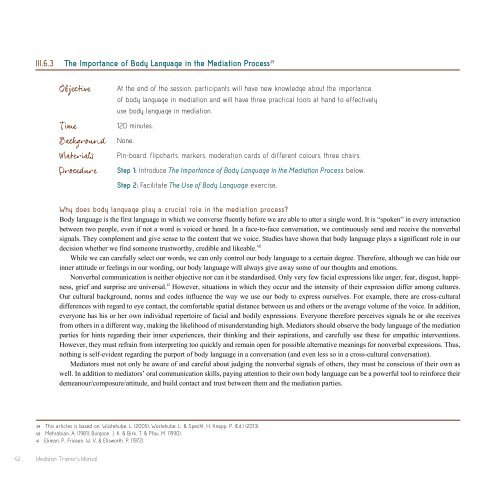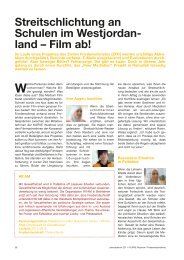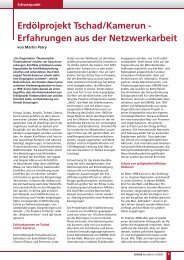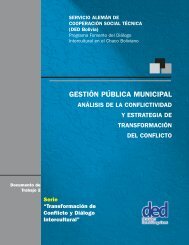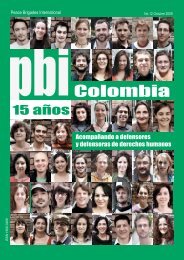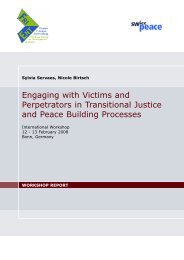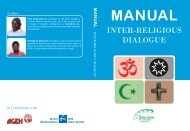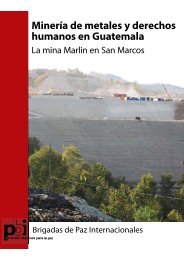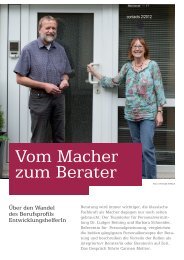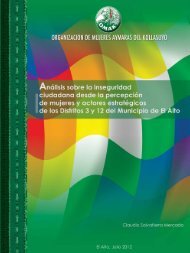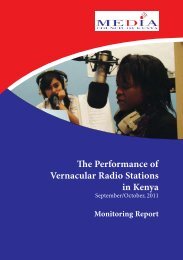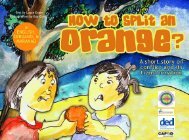Merging Ethiopian Wise-Counsel Mediation and Facilitative ...
Merging Ethiopian Wise-Counsel Mediation and Facilitative ...
Merging Ethiopian Wise-Counsel Mediation and Facilitative ...
- No tags were found...
You also want an ePaper? Increase the reach of your titles
YUMPU automatically turns print PDFs into web optimized ePapers that Google loves.
III.6.3 The Importance of Body Language in the <strong>Mediation</strong> Process 39At the end of the session, participants will have new knowledge about the importanceof body language in mediation <strong>and</strong> will have three practical tools at h<strong>and</strong> to effectivelyuse body language in mediation.120 minutes.None.Pin-board, flipcharts, markers, moderation cards of different colours, three chairs.Step 1: Introduce The Importance of Body Language in the <strong>Mediation</strong> Process below.Step 2: Facilitate The Use of Body Language exercise.Why does body language play a crucial role in the mediation process?Body language is the first language in which we converse fluently before we are able to utter a single word. It is “spoken” in every interactionbetween two people, even if not a word is voiced or heard. In a face-to-face conversation, we continuously send <strong>and</strong> receive the nonverbalsignals. They complement <strong>and</strong> give sense to the content that we voice. Studies have shown that body language plays a significant role in ourdecision whether we find someone trustworthy, credible <strong>and</strong> likeable. 40While we can carefully select our words, we can only control our body language to a certain degree. Therefore, although we can hide ourinner attitude or feelings in our wording, our body language will always give away some of our thoughts <strong>and</strong> emotions.Nonverbal communication is neither objective nor can it be st<strong>and</strong>ardised. Only very few facial expressions like anger, fear, disgust, happiness,grief <strong>and</strong> surprise are universal. 41 However, situations in which they occur <strong>and</strong> the intensity of their expression differ among cultures.Our cultural background, norms <strong>and</strong> codes influence the way we use our body to express ourselves. For example, there are cross-culturaldifferences with regard to eye contact, the comfortable spatial distance between us <strong>and</strong> others or the average volume of the voice. In addition,everyone has his or her own individual repertoire of facial <strong>and</strong> bodily expressions. Everyone therefore perceives signals he or she receivesfrom others in a different way, making the likelihood of misunderst<strong>and</strong>ing high. Mediators should observe the body language of the mediationparties for hints regarding their inner experiences, their thinking <strong>and</strong> their aspirations, <strong>and</strong> carefully use these for empathic interventions.However, they must refrain from interpreting too quickly <strong>and</strong> remain open for possible alternative meanings for nonverbal expressions. Thus,nothing is self-evident regarding the purport of body language in a conversation (<strong>and</strong> even less so in a cross-cultural conversation).Mediators must not only be aware of <strong>and</strong> careful about judging the nonverbal signals of others, they must be conscious of their own aswell. In addition to mediators’ oral communication skills, paying attention to their own body language can be a powerful tool to reinforce theirdemeanour/composure/attitude, <strong>and</strong> build contact <strong>and</strong> trust between them <strong>and</strong> the mediation parties.39 This articles is based on: Wüstehube, L. (2005); Wüstehube, L. & Specht, H. Knapp, P. (Ed.) (2013).40 Mehrabian, A. (1981); Burgoon, J. K. & Birk, T. & Pfau, M. (1990).41 Ekman, P., Friesen, W. V. & Ellsworth, P. (1972).62 <strong>Mediation</strong> Trainer’s Manual


